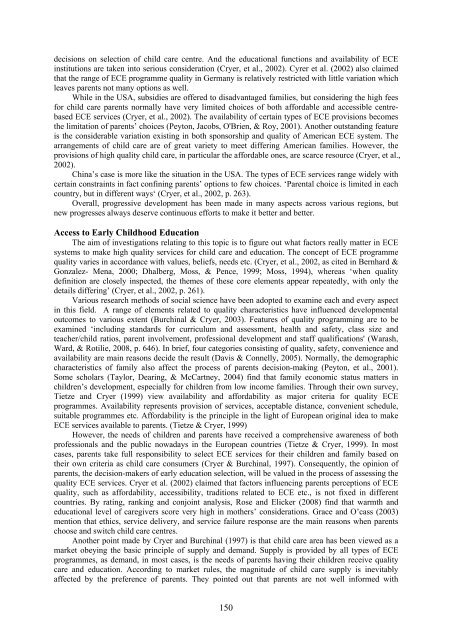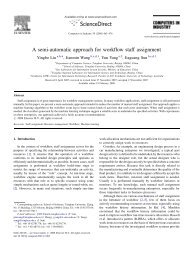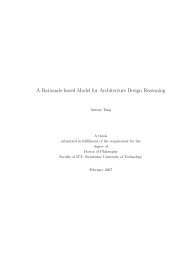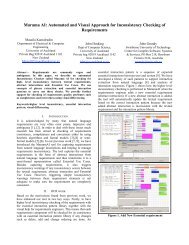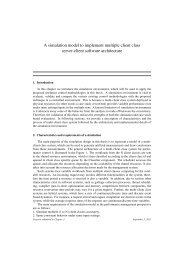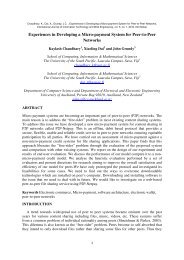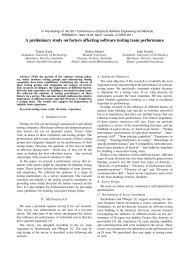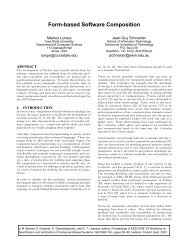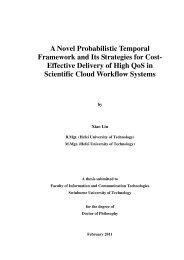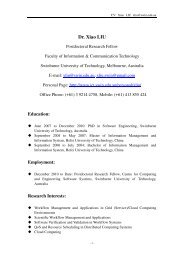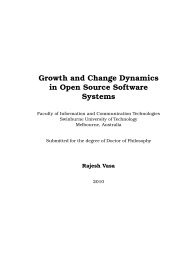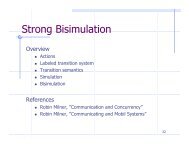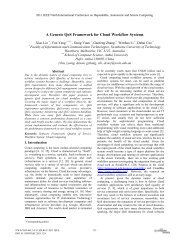Workshop proceeding - final.pdf - Faculty of Information and ...
Workshop proceeding - final.pdf - Faculty of Information and ...
Workshop proceeding - final.pdf - Faculty of Information and ...
You also want an ePaper? Increase the reach of your titles
YUMPU automatically turns print PDFs into web optimized ePapers that Google loves.
decisions on selection <strong>of</strong> child care centre. And the educational functions <strong>and</strong> availability <strong>of</strong> ECE<br />
institutions are taken into serious consideration (Cryer, et al., 2002). Cyrer et al. (2002) also claimed<br />
that the range <strong>of</strong> ECE programme quality in Germany is relatively restricted with little variation which<br />
leaves parents not many options as well.<br />
While in the USA, subsidies are <strong>of</strong>fered to disadvantaged families, but considering the high fees<br />
for child care parents normally have very limited choices <strong>of</strong> both affordable <strong>and</strong> accessible centrebased<br />
ECE services (Cryer, et al., 2002). The availability <strong>of</strong> certain types <strong>of</strong> ECE provisions becomes<br />
the limitation <strong>of</strong> parents’ choices (Peyton, Jacobs, O'Brien, & Roy, 2001). Another outst<strong>and</strong>ing feature<br />
is the considerable variation existing in both sponsorship <strong>and</strong> quality <strong>of</strong> American ECE system. The<br />
arrangements <strong>of</strong> child care are <strong>of</strong> great variety to meet differing American families. However, the<br />
provisions <strong>of</strong> high quality child care, in particular the affordable ones, are scarce resource (Cryer, et al.,<br />
2002).<br />
China’s case is more like the situation in the USA. The types <strong>of</strong> ECE services range widely with<br />
certain constraints in fact confining parents’ options to few choices. ‘Parental choice is limited in each<br />
country, but in different ways‘ (Cryer, et al., 2002, p. 263).<br />
Overall, progressive development has been made in many aspects across various regions, but<br />
new progresses always deserve continuous efforts to make it better <strong>and</strong> better.<br />
Access to Early Childhood Education<br />
The aim <strong>of</strong> investigations relating to this topic is to figure out what factors really matter in ECE<br />
systems to make high quality services for child care <strong>and</strong> education. The concept <strong>of</strong> ECE programme<br />
quality varies in accordance with values, beliefs, needs etc. (Cryer, et al., 2002, as cited in Bernhard &<br />
Gonzalez- Mena, 2000; Dhalberg, Moss, & Pence, 1999; Moss, 1994), whereas ‘when quality<br />
definition are closely inspected, the themes <strong>of</strong> these core elements appear repeatedly, with only the<br />
details differing’ (Cryer, et al., 2002, p. 261).<br />
Various research methods <strong>of</strong> social science have been adopted to examine each <strong>and</strong> every aspect<br />
in this field. A range <strong>of</strong> elements related to quality characteristics have influenced developmental<br />
outcomes to various extent (Burchinal & Cryer, 2003). Features <strong>of</strong> quality programming are to be<br />
examined ‘including st<strong>and</strong>ards for curriculum <strong>and</strong> assessment, health <strong>and</strong> safety, class size <strong>and</strong><br />
teacher/child ratios, parent involvement, pr<strong>of</strong>essional development <strong>and</strong> staff qualifications' (Warash,<br />
Ward, & Rotilie, 2008, p. 646). In brief, four categories consisting <strong>of</strong> quality, safety, convenience <strong>and</strong><br />
availability are main reasons decide the result (Davis & Connelly, 2005). Normally, the demographic<br />
characteristics <strong>of</strong> family also affect the process <strong>of</strong> parents decision-making (Peyton, et al., 2001).<br />
Some scholars (Taylor, Dearing, & McCartney, 2004) find that family economic status matters in<br />
children’s development, especially for children from low income families. Through their own survey,<br />
Tietze <strong>and</strong> Cryer (1999) view availability <strong>and</strong> affordability as major criteria for quality ECE<br />
programmes. Availability represents provision <strong>of</strong> services, acceptable distance, convenient schedule,<br />
suitable programmes etc. Affordability is the principle in the light <strong>of</strong> European original idea to make<br />
ECE services available to parents. (Tietze & Cryer, 1999)<br />
However, the needs <strong>of</strong> children <strong>and</strong> parents have received a comprehensive awareness <strong>of</strong> both<br />
pr<strong>of</strong>essionals <strong>and</strong> the public nowadays in the European countries (Tietze & Cryer, 1999). In most<br />
cases, parents take full responsibility to select ECE services for their children <strong>and</strong> family based on<br />
their own criteria as child care consumers (Cryer & Burchinal, 1997). Consequently, the opinion <strong>of</strong><br />
parents, the decision-makers <strong>of</strong> early education selection, will be valued in the process <strong>of</strong> assessing the<br />
quality ECE services. Cryer et al. (2002) claimed that factors influencing parents perceptions <strong>of</strong> ECE<br />
quality, such as affordability, accessibility, traditions related to ECE etc., is not fixed in different<br />
countries. By rating, ranking <strong>and</strong> conjoint analysis, Rose <strong>and</strong> Elicker (2008) find that warmth <strong>and</strong><br />
educational level <strong>of</strong> caregivers score very high in mothers’ considerations. Grace <strong>and</strong> O’cass (2003)<br />
mention that ethics, service delivery, <strong>and</strong> service failure response are the main reasons when parents<br />
choose <strong>and</strong> switch child care centres.<br />
Another point made by Cryer <strong>and</strong> Burchinal (1997) is that child care area has been viewed as a<br />
market obeying the basic principle <strong>of</strong> supply <strong>and</strong> dem<strong>and</strong>. Supply is provided by all types <strong>of</strong> ECE<br />
programmes, as dem<strong>and</strong>, in most cases, is the needs <strong>of</strong> parents having their children receive quality<br />
care <strong>and</strong> education. According to market rules, the magnitude <strong>of</strong> child care supply is inevitably<br />
affected by the preference <strong>of</strong> parents. They pointed out that parents are not well informed with<br />
150


